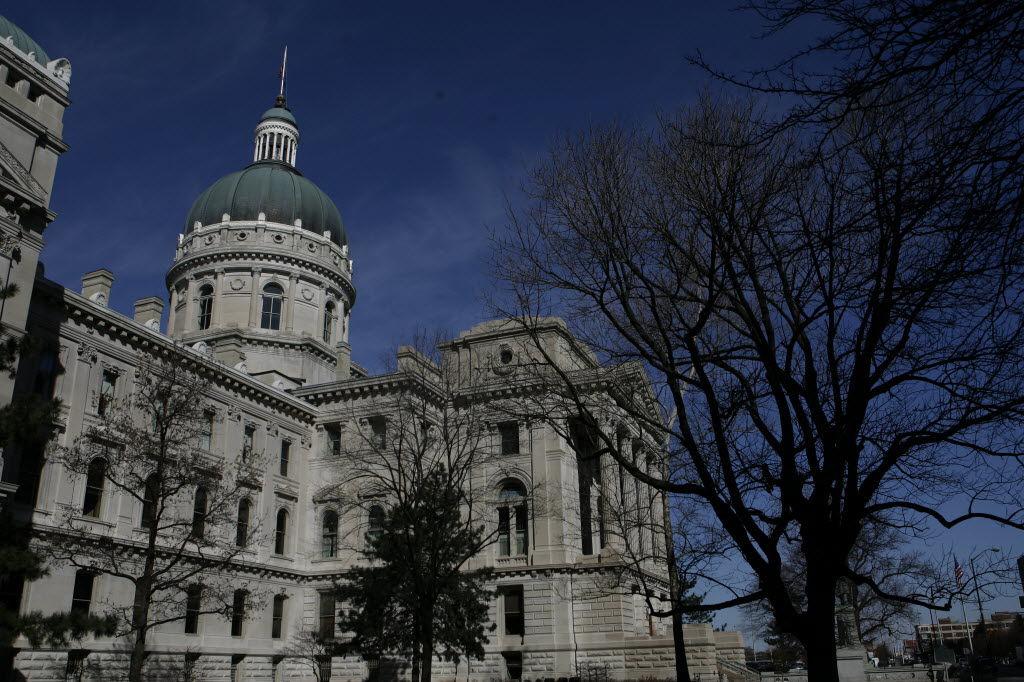Here's What Happened to Key Bills in Indiana's Legislature This Year

By Indianapolis Star Staff Report
March 15, 2020 - Lawmakers ended the 2020 legislative session early Thursday morning after tackling long-discussed issues, such as the legal smoking age and cellphone use while driving.
Last-hour efforts failed that would have potentially helped remove embattled Attorney General Curtis Hill from office.

The Indiana Statehouse in Indianapolis.
File Photo
Perhaps the most publicly discussed issue prior to the session, the matter of raising teacher pay, will wait until at least 2021.
Here’s a look back at some of the key bills introduced this session in the General Assembly:
Phones own, eyes on the road
Lawmakers passed a bill prohibiting holding or using a cellphone while operating a motor vehicle unless the driver is using hands-free or voice-operated technology, such as a cradle or Bluetooth, or in the event of an emergency to call 911.
The bill saw strong support from law enforcement officials, individuals affected by distracted driving collisions, and representatives from the health care industry and automakers.
The bill now heads to the governor’s desk.
Smoking age raised to 21
Indiana lawmakers followed a recent change to federal law by raising the age to use tobacco products from 18 to 21 years old, including smoking and vaping.
The bill now heads to the governor to sign.
Attorney general measure dies
Amid a pending disciplinary case against Attorney General Curtis Hill, some lawmakers tried to clarify the eligibility rules of the office with language that could have forced Hill out.
Senate Bill 178 was amended this month in the House to include language that says an individual who holds the office of attorney general cannot remain in office if he or she is disbarred or suspended for 30 or more days in Indiana. The individual also wouldn’t be able to run for the position again.
The amendment, introduced by House Rep. Timothy Wesco, R-Elkhart, was filed in response to an Indiana Supreme Court disciplinary case against Hill. The case alleges Hill inappropriately touched four women, and a hearing officer has recommended Hill’s law license be suspended for two months. The Indiana Supreme Court will decide what happens to Hill.
The legislation ultimately failed because lawmakers in both the House and Senate could not agree on the bill’s language before the legislative session ended.
Protections stripped from many renters
Senate Bill 148 would ensure any regulations of landlord-tenant relationships — such as leasing conditions, fees a landlord may charge or what a landlord is required to disclose to prospective tenants — must be set at the state level.
Local ordinances in South Bend, Indianapolis, Bloomington and other communities would be overruled. In Indianapolis, that means a set of new protections for renters would be stripped away by lawmakers.
The bill also would officially make it illegal to retaliate against a renter who reports unlivable conditions.
However, critics say SB 148 lacks the teeth necessary for any real enforcement and say the bill falls far short of Indianapolis’ ordinances.
The Indiana Apartment Association lobbied for the bill. About 300 individuals and organizations — which includes some Indiana cities and several groups representing veterans, elderly citizens, minorities, immigrants, domestic violence victims, those of Christian and Jewish faiths, homeless families, medical professionals and more — were opposed.
It passed both chambers predominantly along party lines.
Referendum sharing with charter schools
Charter schools will have the chance to get a slice of property tax referendum dollars, thanks to language added in the waning days of the legislative session to a tax matters bill.
The provision will give public school districts the ability to share the proceeds generated from a voter-approved property-tax hike should they choose to, though it’s unclear what districts would choose to do so.
The measure is a contentious one. Public school advocates worry legislators are seeking to further undermine the traditional public school systems they say have been under attack for years, and some lawmakers criticized the last-minute nature of the addition.
ILEARN, testing and teachers
At the start of the legislative session, thousands of teachers marched on the Statehouse to request three things: better pay, a break from high-stakes test scores and the repeal of new license renewal requirements.
They got two out of the three — and a bonus.
The legislature rushed through a bill giving schools and teachers a two-year reprieve from the consequences of test scores. The state administered a new standardized test, ILEARN, last spring, and the results were precipitous drops from scores on the previous test.
The “hold harmless” bill gives schools two years free of potential negative effects.
Lawmakers also turned a mandate that teachers complete 15 hours of professional development related to their communities’ workforce needs — something passed last session that raised the ire of teachers statewide — into an option.
And while it wasn’t on the immediate list of demands from teachers marching in November, decoupling teacher evaluations from test scores has long been something teachers and the state’s largest teachers union had advocated.
It happened this year, as lawmakers removed test scores from the list of things on which teachers must be measured.
Republicans push through coal bill
House Bill 1414, largely supported by the GOP, slows the process of shutting down a coal plant.
The bill requires the state’s utility regulatory commission to analyze and issue a report on a utility’s plan to retire a coal power plant. It also provides priority for training and resources to workers in the coal mining and power industry.
This bill extends through May 1, 2021. The legislation has been embraced by coal interests but criticized by environmental activists and some business interests as an industry bailout.
The bill now heads to the governor.
Lawmakers end state protection of certain wetlands
Senate Bill 229 removes state oversight of certain wetlands near what are called regulated drains, which are thousands of miles of man-made ditches, streams, sewers and drainage pipes constructed throughout Indiana in the past century to alleviate flooding.
The bill would allow county surveyors to clear such wetlands when they make repairs to regulated drains without permission from the Indiana Department of Environmental Management.
IDEM opposed the bill, saying clearing wetlands would lead to more flooding, less clean water and the loss of wildlife.
Both chambers approved the bill Wednesday, largely along party lines with Republicans in favor and Democrats opposed. It now heads to the governor’s desk.
Panhandling restrictions expanded
The General Assembly made panhandling illegal within 50 feet of a public monument or any place of a financial transaction, including parking garages and meters.
The legislation also forbids active panhandling at all times of day, rather than just before sunrise and after sunset. Current law does not forbid passive panhandling, which includes holding a sign without orally asking for money.

